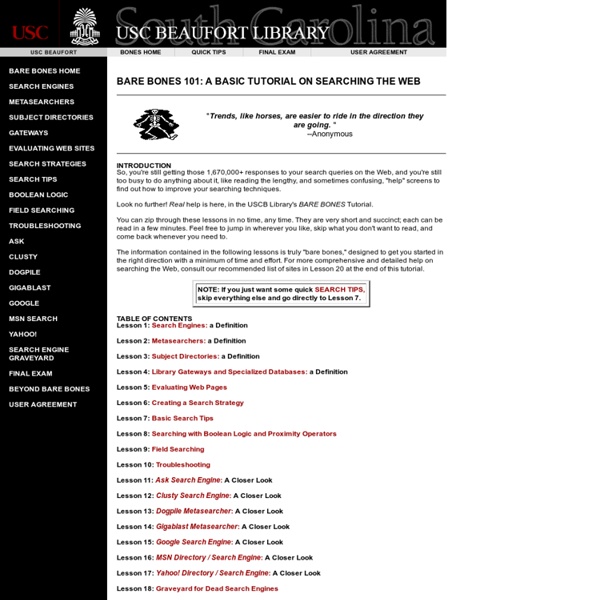How to Properly Research Online (and Not Embarrass Yourself with the Results)
Warning: if you are going to argue a point about politics, medicine, animal care, or gun control, then you better take the time to make your argument legit. Spending 10 seconds with Google and copy-pasting wikipedia links doesn't cut it. The standard for an intelligent argument is Legitimate research is called RE-search for a reason: patient repetition and careful filtering is what will win the day.
Les 6 étapes d'un projet de recherche d'information (1996-2011) - Pédagogie du projet
Démarche adaptée et mise à jour par Hélène Guertin avec la collaboration de Paulette Bernhard, professeure honoraire, École de bibliothéconomie et des sciences de l'information (EBSI), Université de Montréal, Québec, à partir de l'ouvrage La recherche d'information à l'école secondaire : l'enseignant et le bibliothécaire, partenaires de l'élève (1997) - Crédits Note : Le travail d'élaboration de la démarche a bénéficié de l'accès privilégié au document de travail daté de 1996, obtenu avec la permission de Yves Léveillé, dont le titre provisoire était La recherche d'information à l'école secondaire : un projet de recherche d'information en six étapes. La présente version remaniée (2005) respecte l'esprit du document : Les compétences transversales dans Programme de formation de l'école québécoise, enseignement secondaire (2004), ministère de l'Éducation du Québec. Page consultée le 5 juillet 2005. Autres sources consultées pour la mise à jour de 2005.
Deep Web
From Wikipedia, the free encyclopedia (Redirected from Deep Web) Deep Web may refer to:
Web profond
Un article de Wikipédia, l'encyclopédie libre. Ne doit pas être confondu avec darknet. Ne pas confondre[modifier | modifier le code] Ressources profondes[modifier | modifier le code]
Dark Internet
Causes[edit] Failures within the allocation of Internet resources due to the Internet's chaotic tendencies of growth and decay are a leading cause of dark address formation. One form of dark address is military sites on the archaic MILNET. These government networks are sometimes as old as the original ARPANET, and have simply not been incorporated into the Internet's evolving architecture. See also[edit] References[edit]
Web search query
Types[edit] There are four broad categories that cover most web search queries:[1] Informational queries – Queries that cover a broad topic (e.g., colorado or trucks) for which there may be thousands of relevant results.Navigational queries – Queries that seek a single website or web page of a single entity (e.g., youtube or delta air lines).Transactional queries – Queries that reflect the intent of the user to perform a particular action, like purchasing a car or downloading a screen saver. Search engines often support a fourth type of query that is used far less frequently: Connectivity queries – Queries that report on the connectivity of the indexed web graph (e.g., Which links point to this URL?
Searching Without Objectives
Bio Kenneth O. Stanley is an assistant professor in the Department of Electrical Engineering and Computer Science at the University of Central Florida. His Ph.D. is from the University of Texas at Austin. He is an inventor of the Neuroevolution of Augmenting Topologies (NEAT) and HyperNEAT algorithms for evolving complex artificial neural networks.
Internet Search Tips and Strategies
.:VirtualSalt Robert Harris Version Date: July 6, 2000 Overview
WebSummarizer
Web Summarizer is a web-based application specializing in the automatic summarization and visualization of web pages, documents and plain text. WikiSummarizer, a module of WebSummarizer, is a web-based application specializing in the automatic summarization of Wikipedia articles. An integral part of WikiSummarizer is the Wikipedia Knowledge Base. The knowledge base contains summaries of over 3 million Wikipedia articles and provides about 5 million keywords for instant access, discovery, visualization and downloading.



